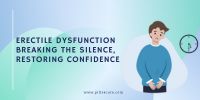Erectile dysfunction (ED) is one of the most common health concerns affecting men in the United States, cutting across different age groups and deeply influencing overall quality of life. Medically, erectile dysfunction in men is described as the persistent inability to achieve or sustain an erection firm enough for satisfying sexual activity. Unlike occasional performance issues, the erectile dysfunction definition refers to a problem that continues for at least three months. Recognizing what erectile dysfunction means helps both patients and healthcare providers create effective solutions. Today, a variety of treatment options are available, ranging from lifestyle changes to prescription Erectile Dysfunction medicine. Among these, Super Kamagra is often discussed as a potential option for men seeking improved sexual performance and confidence.
What is Erectile Dysfunction?
Erectile dysfunction symptoms in men can vary significantly, but the core erectile dysfunction definition remains consistent: the inability to achieve or sustain an erection adequate for sexual intercourse. This condition affects approximately 30 million American men, with prevalence increasing with age, though it can occur at any stage of adult life.
ED in men represents a complex interplay of physical, psychological, and lifestyle factors. The condition is not simply a normal part of aging, contrary to common misconceptions. Modern medical understanding recognizes that effective treatments are available for most men experiencing these challenges.
Types of Erectile Dysfunction
1. Organic Erectile Dysfunction
This type stems from physical causes affecting blood flow, nerve function, or hormonal balance. Organic ED typically develops gradually and may be associated with underlying health conditions such as diabetes, cardiovascular disease, or neurological disorders.
2. Psychogenic Erectile Dysfunction
Psychogenic ED in men originates from psychological factors including stress, anxiety, depression, or relationship issues. This type often has a sudden onset and may be situational, occurring with some partners but not others.
3. Mixed Erectile Dysfunction
The most common form combines both physical and psychological elements. Mixed ED often begins with a physical cause, leading to performance anxiety that perpetuates the problem.
4. Neurogenic Erectile Dysfunction
This type results from nerve damage affecting the signals between the brain and reproductive organs. Conditions such as spinal cord injuries, multiple sclerosis, or surgical procedures can cause neurogenic ED.
5. Vasculogenic Erectile Dysfunction
Vasculogenic ED occurs when blood flow to or from the penis is compromised. This can involve either inadequate blood inflow (arterial insufficiency) or excessive blood outflow (venous leakage).
6. Hormonal Erectile Dysfunction
Low testosterone levels or other hormonal imbalances can contribute to erectile dysfunction symptoms in men. This type often accompanies decreased libido and other symptoms of hormonal deficiency.
Common Causes of Erectile Dysfunction
Physical Causes
- Cardiovascular Disease: Poor heart health directly impacts blood flow throughout the body, including the penis
- Diabetes: High blood sugar levels damage blood vessels and nerves essential for healthy erectile function
- Obesity: Excess weight contributes to hormonal imbalances and reduced blood flow
- High Blood Pressure: Hypertension affects blood vessel function and circulation
- Neurological Conditions: Multiple sclerosis, Parkinson’s disease, and spinal injuries can disrupt nerve signals
- Hormonal Disorders: Low testosterone, thyroid problems, and other endocrine issues
- Medication Side Effects: Certain antidepressants, blood pressure medications, and other drugs can cause ED
Psychological Causes
- Performance Anxiety: Fear of sexual failure creates a cycle of ongoing difficulty
- Depression and Anxiety: Mental health conditions significantly impact sexual function
- Relationship Stress: Communication problems and emotional disconnect with partners
- Work-Related Stress: Professional pressures and chronic stress affect overall health
- Self-Esteem Issues: Poor body image and confidence problems contribute to ED
Lifestyle Factors
- Smoking: Tobacco use severely restricts blood flow and damages blood vessels
- Excessive Alcohol Consumption: Regular heavy drinking impairs sexual function
- Lack of Physical Activity: Sedentary lifestyle contributes to poor circulation and overall health
- Poor Diet: Unhealthy eating patterns affect cardiovascular and overall health
- Sleep Disorders: Inadequate sleep disrupts hormone production and overall well-being
Erectile Dysfunction Diagnosis
Proper erectile dysfunction diagnosis requires a comprehensive evaluation by a qualified healthcare provider. The diagnostic process typically includes:
Medical History Review
Healthcare providers conduct detailed interviews covering:
- Duration and severity of symptoms
- Medical conditions and current medications
- Lifestyle factors and habits
- Psychological and relationship factors
- Previous treatments attempted
Physical Examination
A thorough physical exam assesses:
- Cardiovascular health indicators
- Genital examination for structural abnormalities
- Neurological function testing
- Signs of hormonal imbalances
Laboratory Tests
Blood tests may evaluate:
- Testosterone levels
- Blood sugar and diabetes markers
- Cholesterol and lipid profiles
- Thyroid function
- Complete blood count
Specialized Testing
Advanced diagnostic tools may include:
- Nocturnal penile tumescence testing
- Penile Doppler ultrasound
- Psychological assessments
- Specialized vascular studies
Treatment Options
Lifestyle Modifications
Fundamental changes often provide significant improvement:
- Regular cardiovascular exercise
- Healthy diet emphasizing fruits, vegetables, and whole grains
- Weight management
- Smoking cessation
- Moderate alcohol consumption
- Stress reduction techniques
Erectile Dysfunction Medicine
Several FDA-approved medications effectively treat ED in men:
- Oral medications that enhance blood flow
- Injectable medications for direct penile administration
- Urethral suppositories
- Topical treatments
The choice of erectile dysfunction medicine depends on individual health status, severity of symptoms, and potential drug interactions.
Medical Devices
Non-pharmaceutical options include:
- Vacuum erection devices
- Penile rings
- External support systems
Surgical Interventions
For severe cases unresponsive to other treatments:
- Penile implants
- Vascular reconstruction surgery
- Arterial revascularization procedures
Natural Remedies for Erectile Dysfunction
Many men seek natural remedies for erectile dysfunction as complementary or alternative treatments:
Herbal Supplements
- Ginseng: Research suggests potential benefits for erectile function
- L-Arginine: Amino acid that may improve blood flow
- Ginkgo Biloba: Traditional herb studied for circulation enhancement
- Horny Goat Weed: Popular traditional remedy with limited scientific evidence
Dietary Approaches
- Mediterranean diet rich in antioxidants
- Foods high in nitrates (beets, leafy greens)
- Dark chocolate containing flavonoids
- Watermelon containing citrulline
Mind-Body Techniques
- Meditation and mindfulness practices
- Yoga and tai chi
- Deep breathing exercises
- Progressive muscle relaxation
Acupuncture
Traditional Chinese medicine approach showing promise in some studies for improving erectile function.
Is Erectile Dysfunction Permanent?
A common concern among men is whether erectile dysfunction is permanent. The answer depends largely on the underlying cause and individual circumstances. Many cases of ED are treatable and potentially reversible, especially when addressed early and comprehensively.
Factors Affecting Reversibility
- Underlying Health Conditions: Managing diabetes, heart disease, and other conditions can improve ED
- Medication-Related ED: Often resolves when problematic medications are adjusted
- Lifestyle-Related ED: Frequently improves with healthy lifestyle changes
- Psychological ED: Often responds well to counseling and stress management
Permanent Cure for Erectile Dysfunction
While the concept of a permanent cure for erectile dysfunction is appealing, the reality is more complex. ED treatment often requires ongoing management rather than a one-time cure. However, many men achieve excellent long-term results through:
- Consistent lifestyle modifications
- Appropriate medical treatment
- Regular medical follow-up
- Addressing underlying health conditions
- Psychological support when needed
Success rates vary, but the majority of men with ED can achieve satisfactory improvement in sexual function with proper treatment.
Super Kamagra and Treatment Considerations
Super Kamagra represents one category of erectile dysfunction medicine that combines active ingredients to address both ED and premature ejaculation. Like all ED medications, it requires proper medical supervision and evaluation to ensure safety and effectiveness.
When considering any erectile dysfunction medicine, including Super Kamagra, important factors include:
- Individual health status and medical history
- Potential drug interactions
- Proper dosage and administration
- Regular medical monitoring
- Understanding of potential side effects
Precautions and Safety Considerations
Medical Precautions
- Cardiovascular Screening: Essential before starting any ED treatment
- Drug Interactions: Many ED medications interact with heart medications
- Underlying Conditions: Proper management of diabetes, hypertension, and other conditions
- Allergic Reactions: Awareness of potential allergic responses to treatments
Lifestyle Precautions
- Avoid combining ED medications with alcohol or recreational drugs
- Maintain regular exercise appropriate for individual fitness level
- Follow prescribed dosages exactly as directed
- Report any adverse effects to healthcare providers promptly
Psychological Considerations
- Open communication with partners about treatment expectations
- Professional counseling when psychological factors contribute to ED
- Realistic expectations about treatment outcomes
- Patience with treatment response times
When to Seek Medical Help
Men should consult healthcare providers when experiencing:
- Consistent difficulty achieving or maintaining erections for three months or more
- Sudden onset of erectile problems
- ED accompanied by other concerning symptoms
- Relationship stress related to sexual performance
- Anxiety or depression related to sexual function
Early intervention often leads to better treatment outcomes and prevents the condition from worsening.
Frequently Asked Questions
Can stress alone cause erectile dysfunction?
Yes, psychological stress can absolutely cause erectile dysfunction symptoms in men. Chronic stress affects hormone levels, blood flow, and psychological well-being, all contributing to ED.
Are there exercises that help with erectile dysfunction?
Regular cardiovascular exercise improves blood flow and overall health, potentially improving ED. Kegel exercises, which strengthen pelvic floor muscles, may also provide benefits for some men.
How long does it take for natural remedies to work?
Natural remedies for erectile dysfunction typically require several weeks to months to show effects. Results vary significantly among individuals, and scientific evidence for many natural treatments remains limited.
Can erectile dysfunction be prevented?
While not all cases are preventable, maintaining good cardiovascular health, managing stress, avoiding smoking, limiting alcohol consumption, and maintaining a healthy weight can reduce ED risk.
Can young men experience erectile dysfunction?
Yes, ED in men can occur at any age. In younger men, psychological factors, lifestyle choices, or underlying health conditions may contribute to the problem.
Do all erectile dysfunction medications work the same way?
While many ED medications work through similar mechanisms (enhancing blood flow), they differ in onset time, duration of action, and potential side effects. Individual response varies.
Can erectile dysfunction affect relationships?
ED can significantly impact relationships, affecting intimacy, communication, and emotional connection. Open communication and joint treatment approaches often help couples navigate these challenges.
Is erectile dysfunction covered by insurance?
Coverage varies by insurance plan and specific treatments. Many plans cover medical consultations and some treatments, but coverage for erectile dysfunction medicine may be limited.
How do I choose the right treatment for my erectile dysfunction?
Treatment selection should involve consultation with healthcare providers who can evaluate individual health status, preferences, and specific circumstances to recommend appropriate options.


